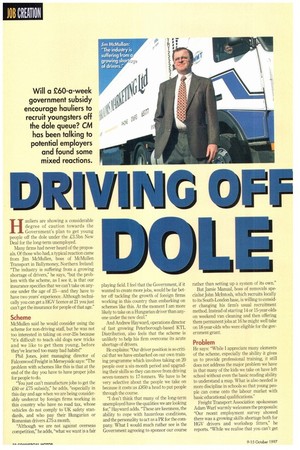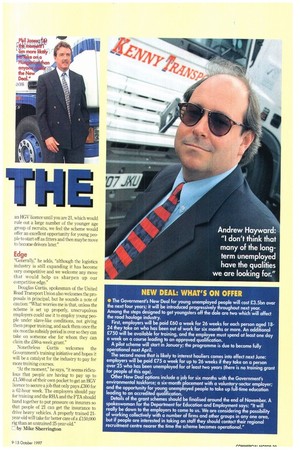JOB CREATION
Page 40

Page 41

If you've noticed an error in this article please click here to report it so we can fix it.
Will a £60-a-week government subsidy encourage hauliers to recruit youngsters off the dole queue? CM has been talking to potential employers and found some mixed reactions.
Hauliers are showing a considerable degree of caution towards the Government's plan to get young people off the dole under the £3.5bn New Deal for the long-term unemployed.
Many firms had never heard of the proposals. Of those who had, a typical reaction came from Jim McMullen, boss of McMullen Transport in Ballymoney, Northern Ireland: "The industry is suffering from a growing shortage of drivers," he says, "but the problem with the scheme, as I see it, is that our insurance specifies that we can't take on anyone under the age of 25—and they have to have two years' experience. Although technically you can get a HGV licence at 21 you just can't get the insurance for people of that age."
Scheme
McMullen said he would consider using the scheme for non-driving staff, but he was not too interested in taking on over-25s because "it's difficult to teach old dogs new tricks and we like to get them young, before they've learned too many bad habits!"
Phil Jones, joint managing director of Falconwood Freight in Merseyside says: "The problem with schemes like this is that at the end of the day you have to have proper jobs for people to do.
"You just can't manufacture jobs to get the £60 or £75 subsidy," he adds, "especially in this day and age when we are being considerably undercut by foreign firms working in this country who have no road tax, whose vehicles do not comply to.UK safety standards, and who pay their Hungarian or Romanian drivers £75 a month.
"Although we are not against overseas competition," he adds, "what we want is a fair playing field. I feel that the Government, if it wanted to create more jobs, would be far better off tackling the growth of foreign firms working in this country than embarking on schemes like this. At the moment I am more likely to take on a Hungarian driver than anyone under the new deal."
And Andrew Hayward, operations director of fast growing Peterborough-based KTL Distribution, also feels that the scheme is unlikely to help his firm overcome its acute shortage of drivers.
He explains: "Our driver position is so critical that we have embarked on our own training programme which involves taking on 20 people over a six-month period and upgrading their skills so they can move from driving seven-tonners to 17-tonners. We have to be very selective about the people we take on because it costs us £850 a head to put people through the course.
"I don't think that many of the long-term unemployed have the qualities we are looking for," Hayward adds. "These are keenness, the ability to cope with hazardous conditions, and the personality to act as a PR for the company. What I would much rather see is the Government agreeing to sponsor our course rather than setting up a system of its own."
But Jamie Manual, boss of removals specialist John McIntosh, which recruits locally to its South-London base, is willing to consider changing his firm's usual recruitment method. Instead of starting 14 or 15-year-olds on weekend van cleaning and then offering them permanent jobs at 16 he might well take on 18-year-olds who were eligible for the government grant.
Problem
He says: "While I appreciate many elements of the scheme, especially the ability it gives us to provide professional training, it still does not address the major problem we have in that many of the kids we take on have left school without even the basic reading ability to understand a map. What is also needed is more discipline in schools so that young people can come onto the labour market with basic educational qualifications."
Freight Transport Association spokesman Adam Wurf warmly welcomes the proposals: "Our recent employment survey showed there was a growing skills shortage both for HGV drivers and workshop fitters," he reports. "While we realise that you can't get an HGV licence until you are 21, which would rule out a large number of the younger age group of recruits, we feel the scheme would offer an excellent opportunity for young people to start off as fitters and then maybe move to become drivers later."
Edge
"Generally," he adds, "although the logistics industry is still expanding it has become very competitive and we welcome any move that would help us sharpen up our competitive edge."
Douglas Curtis, spokesman of the United Road Transport Union also welcomes the proposals in principal, but he sounds a note of caution: "What worries me is that, unless the scheme is set up properly, unscrupulous employers could use it to employ young people under slave-like conditions, not giving them proper training, and sack them once the six-months subsidy period is over so they can take on someone else for whom they can claim the L60-a-week grant."
Nonetheless Curtis welcomes the Government's training initiative and hopes it will be a catalyst for the industry to pay for more training courses.
"At the moment," he says, "it seems ridiculous that people are haying to pay up to £1,500 out of their own pocket to get an HGV licence to secure a job that only pays £300 for a 62-hour week. The employers should pay for training and the RHA and the ETA should band together to put pressure on insurers so that people of 21 can get the insurance to drive heavy vehicles. A properly trained 21year-old will take far better care of a .E150,000 rig than an untrained 25-year-old."
E by Mike Sherrington
NEW DEAL: WHAT'S ON OFFER
• The Government's New Deal for young unemployed people will cost £3.5bn over the next four years; it will be introduced progressively throughout next year. Among the steps designed to get youngsters off the dole are two which will affect the road haulage industry. First, employers will be paid £60 a week for 26 weeks for each person aged 1824 they take on who has been out of work for six months or more. An additional £750 will be available for training, and the employee must spend at least one day a week on a course leading to an approved qualification. A pilot scheme will start in January; the programme is due to become fully operational next April. The second move that is likely to interest hauliers comes into effect next June: employers will be paid £75 a week for up to 26 weeks if they take on a person over 25 who has been unemployed for at least two years (there is no training grant for people of this age). Other New Deal options include a job for six months with the Government's environmental taskforce; a six-month placement with a voluntary-sector employer; and the opportunity for young unemployed people to take up full-time education leading to an accredited qualification. Details of the grant schemes should be finalised around the end of November. A spokeswoman for the Department for Education and Employment says: "It will really be down to the employers to come to us. We are considering the possibility of working collectively with a number of firms and other groups in any one area, but if people are interested in taking on staff they should contact their regional recruitment centre nearer the time the scheme becomes operational."








































































































